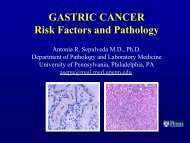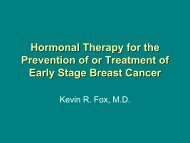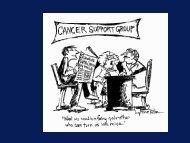Esophageal And Gastric Cancer
Esophageal And Gastric Cancer
Esophageal And Gastric Cancer
- No tags were found...
Create successful ePaper yourself
Turn your PDF publications into a flip-book with our unique Google optimized e-Paper software.
<strong>Esophageal</strong> and <strong>Gastric</strong> <strong>Cancer</strong>:<br />
Updates in Treatment Options<br />
Ursina R. Teitelbaum, M.D.<br />
Hematology/Oncology Division<br />
March 13, 2009
One “Organ System”, Three <strong>Cancer</strong>s<br />
• 35,000 cases/yr<br />
• 25,000 deaths/yr<br />
• Three distinct pathologic entities<br />
– Squamous cell carcinoma of the esophagus<br />
– Adenocarcinoma of the distal esophagus and junction<br />
with stomach (“GE junction”)<br />
– Adenocarcinoma of the distal stomach
<strong>Esophageal</strong> <strong>Cancer</strong><br />
• Epidemiology: M:F = 7:1, Asia<br />
• Etiology: tobacco, EtOH, diet,<br />
Barrett’s Esophagus<br />
• Signs and Symptoms:<br />
dysphagia (difficulty<br />
swallowing), weight loss,<br />
cough, odynophagia (pain)<br />
• Diagnosis: endoscopy,<br />
endoscopic ultrasound, CT<br />
scan, PET scan
Staging of <strong>Esophageal</strong> <strong>Cancer</strong><br />
•TNM Classification<br />
•Clinical Staging<br />
– Localized and resectable (T1-2, N0)<br />
– Potentially resectable (T3 or N1: Stage II<br />
or III)<br />
– Locally advanced unresectable<br />
– Metastatic
Timing of Oncology Treatment<br />
Neoadjuvant:<br />
Adjuvant:<br />
Metastatic:<br />
treatment PRIOR to surgery<br />
treatment AFTER surgery<br />
systemic treatment<br />
not associated with surgery
<strong>Esophageal</strong> <strong>Cancer</strong>:<br />
Treatment Approaches<br />
• Localized disease (Stage 0-II):<br />
– Surgery<br />
– Chemoradiation (platinum, 5-FU)<br />
– Combination neoadjuvant (preoperative)<br />
chemoradiation and surgery
Neoadjuvant Therapy for<br />
<strong>Esophageal</strong> <strong>Cancer</strong><br />
• Neoadjuvant = PREoperative therapy<br />
• Chemotherapy alone<br />
• Radiation alone<br />
• Chemotherapy plus radiation<br />
(chemoradiotherapy)
Neoadjuvant Chemotherapy of<br />
<strong>Esophageal</strong> <strong>Cancer</strong>: Phase III Trial<br />
• n = 802 patients<br />
• 5-FU / cisplatin<br />
• Median survival:<br />
• 16.8 mo. versus 13.3 mo.<br />
• 2 year survival:<br />
• 43% versus 34%<br />
MRC <strong>Esophageal</strong> Working Party.
Preoperative Chemoradiation of<br />
<strong>Esophageal</strong> <strong>Cancer</strong>: Phase III Trials<br />
Inconclusive results in late phase trials<br />
Study<br />
N<br />
3-year Survival, %<br />
Surgery<br />
Combined<br />
Walsh 113 6 32<br />
Urba 100 16 30<br />
EORTC 282 35 37<br />
2 of 3 studies show benefit for chemoradiation
March 1 2008<br />
Small new study in support of chemoradiotherapy<br />
prior to surgery (neoadjuvant)
Trimodality Trial (CALGB 9781)<br />
• 56 patients (planned 475)<br />
• 30 patients chemo/RT and then surgery<br />
and 26 with surgery alone<br />
• Median survival 4.48 years v 1.79 years<br />
• Five-year survival 39% v 16 %
Trimodality Trial (CALGB 9781)<br />
median survival (yrs) p-value<br />
Trimodality 4.48 .002<br />
Surgery 1.79
Trimodality Trial<br />
• Conclusion: long-term survival<br />
advantage with use of CRT followed by<br />
surgery<br />
• Small sample size, poor accrual<br />
• Publication bias for positive trials
Preoperative Chemoradiation of<br />
<strong>Esophageal</strong> <strong>Cancer</strong><br />
•Pathologic Complete Response in 20-<br />
40% of patients at surgery<br />
•5 year Disease Free Survival 25-35%<br />
•Significant toxicity<br />
•5-FU + Cisplatin + Radiation Therapy<br />
• Severe GI toxicity<br />
– Requirement for tube feeding
Localized <strong>Esophageal</strong> <strong>Cancer</strong>:<br />
• RTOG 8501<br />
Primary Chemoradiation<br />
– Chemoradiation (5-FU plus XRT) versus<br />
Radiation alone (64 Gy)<br />
– 5 year Survival: 27% versus 0 % benefit for<br />
chemoradiation
RTOG 8501: Survival<br />
Survival %<br />
100<br />
75<br />
50<br />
25<br />
Combined therapy group<br />
Updated 8-yr survival = 22%*<br />
Combined<br />
Radiation<br />
0 6 12 18 24 30 36<br />
Months since randomization
New Agents For Combined Modality<br />
Treatment with Radiation Therapy<br />
• Irinotecan<br />
– Combined with cisplatin<br />
• Taxanes<br />
– Combined with cisplatin or 5-FU<br />
• Oxaliplatin<br />
– Combined with 5-FU<br />
• Biological agents (in clinical trials)<br />
– Cetuximab (Erbitux)<br />
– Bevacizumab (Avastin)
Treatment of Advanced<br />
<strong>Esophageal</strong> <strong>Cancer</strong><br />
• Chemoradiotherapy – median survival<br />
8 months, palliates dysphagia<br />
• External-beam radiotherapy<br />
• <strong>Esophageal</strong> dilatation<br />
• Stent placement<br />
• Chemotherapy (single vs combination)<br />
• Palliative resection
Treatment: Metastatic Disease<br />
•Preventing or treating<br />
luminal obstruction<br />
– Stent placement<br />
– Tube feeding<br />
•Treatment of<br />
metastatic disease<br />
– Chemotherapy
<strong>Esophageal</strong> Stent Placement<br />
Lesion post-stent pre-stent
Chemotherapy for Advanced<br />
<strong>Esophageal</strong> <strong>Cancer</strong><br />
• Single Agents:<br />
5FU, platinums, taxanes, irinotecan<br />
• Combination Therapy:<br />
Regimen<br />
RR<br />
5FU + cisplatin 34%<br />
Cisplatin + etoposide 48%<br />
Cisplatin + paclitaxel + 5FU 60%<br />
Cisplatin + irinotecan 51-57%<br />
Irinotecan + paclitaxel 27
Adenocarcinoma of the<br />
Esophagus: Ongoing Debates<br />
• Preoperative multimodal therapy is a reasonable treatment option<br />
– Is “a” standard of choice NOT “the” standard<br />
• New combinations of existing chemotherapies to balance efficacy<br />
and toxicity<br />
• Questions remain:<br />
– Who goes to surgery<br />
– Who gets all 3 modalities (surgery, chemotherapy,<br />
radiation therapy)<br />
– How best to manage debilitated or elderly patient
<strong>Gastric</strong> <strong>Cancer</strong><br />
• Epidemiology: M:F = 2.3:1,<br />
median age 70<br />
• 40% of cases are in China<br />
• Blood Group A – higher incidence<br />
• Signs and Symptoms: advanced<br />
presentation: pain, weight loss,<br />
vomiting, early satiety<br />
• Dx: Endoscopy, CT, EUS, PET<br />
• Pathology: adenoca – 95%
<strong>Gastric</strong> <strong>Cancer</strong>: Worldwide incidence<br />
798,000 New Cases in 1990<br />
Western<br />
Europe<br />
Eastern<br />
Europe<br />
Japan<br />
Australia/<br />
New Zealand<br />
China<br />
Northern<br />
Africa<br />
Southern<br />
Africa<br />
Central<br />
America<br />
North<br />
America<br />
Male 16.4<br />
Female 8.2<br />
Male 36.3<br />
Female 16.9<br />
Male 77.9<br />
Female 33.3<br />
Male 10.8<br />
Female 4.9<br />
Male 43.6<br />
Female 19.0<br />
Male 5.9<br />
Female 2.6<br />
Male 11.5<br />
Female 4.3<br />
Male 18.6<br />
Female 13.3<br />
Male 8.4<br />
Female 4.0
<strong>Gastric</strong> <strong>Cancer</strong><br />
1930-1997 Age-adjusted Death Rate<br />
Rate per 100,000 Male Population<br />
80<br />
70<br />
60<br />
50<br />
40<br />
30<br />
20<br />
10<br />
Pancreas<br />
Liver<br />
Prostate<br />
Stomach<br />
Lung & Bronchus<br />
Colon & Rectum<br />
Leukemia<br />
Stomach<br />
Survival improving<br />
0<br />
1930 1940 1950 1960 1970 1980 1990 1997<br />
Year
<strong>Gastric</strong> <strong>Cancer</strong> Treatment<br />
in the 21 st Century<br />
• Chemotherapy is palliative but better than<br />
best supportive care<br />
• No standard regimen universally<br />
recognized; however, 5-FU plus cisplatin<br />
is the most popular<br />
• Quality of Life measures more common<br />
for clinical trials and show QOL IS<br />
associated with efficacy
Neoadjuvant Question in<br />
<strong>Gastric</strong> <strong>Cancer</strong><br />
• Only a few studies that investigate<br />
either chemotherapy or<br />
chemoradiotherapy prior to surgery and<br />
they need to be confirmed<br />
• Open area of study
The “MAGIC” Trial:<br />
Neo/Adjuvant Study in <strong>Gastric</strong> <strong>Cancer</strong><br />
n = 250<br />
ECF x 3 SURGERY ECF x 3<br />
R<br />
n = 253<br />
SURGERY<br />
• 5-year survival: 36% vs 23%<br />
• Time to recurrence improved: (P = 0.0001)<br />
• Increase in R0 resections: 79% versus 69%<br />
• Distant mets in 24% with chemo and 37% without
Feb 20, 2009 – chemotherapy alone versus<br />
Chemotherapy plus radiation before surgery in<br />
Patients with locally advanced cancers of<br />
Lower esophagus or stomach
JCO Feb 20, 2009<br />
• Higher chance of pathologic complete<br />
response with chemo plus radiation<br />
• Higher chance of tumor free lymph<br />
nodes<br />
• Trend to increased 3 year survival from<br />
27.7% to 47.4 %<br />
• No increase in postop mortality
Treatment of Localized<br />
Disease<br />
• Surgery: only chance for cure<br />
• Subtotal vs total gastrectomy<br />
• Adjuvant therapy – survival advantage<br />
with postoperative chemo/RT (5-FU)
Adjuvant Chemoradiation Therapy<br />
for <strong>Gastric</strong> <strong>Cancer</strong><br />
• INT 0116 (NEJM 2001)<br />
– n = 556 pts<br />
– 5FU/LV + XRT<br />
– Median survival:<br />
36 mo vs 27 mo
Unresectable <strong>Gastric</strong> <strong>Cancer</strong><br />
• Survival without therapy: < 6 months<br />
• Radiation therapy for palliation of<br />
bleeding/obstruction<br />
• Single agent chemotherapy (many)<br />
• Combination (ECF: Epirubicin, inf 5-FU,<br />
Cisplatin)<br />
• Clinical trials
The Role of Chemotherapy in<br />
Advanced <strong>Gastric</strong> <strong>Cancer</strong><br />
• Chemotherapy vs best supportive care (BSC)<br />
– Median survival: 7.5-12 mo vs 3-5 mo<br />
– Survival improvement significant in 3 of 4 trials<br />
– For trials measuring QoL, significant improvement<br />
favoring chemotherapy-treated groups<br />
• 5-FU and cisplatin-based regimens<br />
considered reference regimen for many years<br />
• Several new drugs have emerged which<br />
provide more effective and better tolerated<br />
regimens
New Drugs in the Treatment of Advanced<br />
<strong>Gastric</strong> <strong>Cancer</strong><br />
• Irinotecan (Camptosar)<br />
• Taxanes<br />
• Oxaliplatin<br />
• Capecitabine (Xeloda = oral 5-FU)<br />
• S1 (investigational oral 5-FU)
Early Phase Studies of Taxotere in<br />
Advanced <strong>Gastric</strong> <strong>Cancer</strong><br />
• Taxotere/cisplatin is an active<br />
combination<br />
• Taxotere/cisplatin is relatively well<br />
tolerated despite significant hematologic<br />
toxicities (growth factors)<br />
• These studies formed the basis for<br />
further clinical investigation
Taxotere in Advanced <strong>Gastric</strong><br />
<strong>Cancer</strong>: Conclusions (V325)<br />
• Taxotere with cisplatinum/5-FU produces a high<br />
response rate and promising survival outcomes<br />
– better than Cisplatinum/5-FU alone<br />
• More hematologic toxicities but managable<br />
• Quality of Life indices much higher with TCF<br />
• Taxotere/Cisplatin/5-FU (TCF) is an acceptable<br />
alternative to the standard Epirubin/Cisplatin/5-<br />
FU (ECF)
More tolerable treatment options<br />
Jan 2008<br />
Recent evaluation of capecitabine (xeloda),<br />
an oral 5-FU pro-drug, and oxaliplatin, a newer<br />
generation platinum agent
Phase III Study Comparing Capecitabine (X) With 5-FU 5<br />
and<br />
Oxaliplatin With Cisplatin (REAL-2 2 Trial)<br />
1.0<br />
0.8<br />
0.6<br />
0.4<br />
EOX<br />
ECF<br />
Median OS<br />
11.2 (n=244)<br />
9.9 (n=263)<br />
0.2<br />
0.0<br />
p=0.020<br />
0 6 12 18<br />
Months<br />
24 30 36<br />
superior overall survival with EOX vs ECF
Oxaliplatin has reduced toxicity compared to<br />
Cisplatin
OXALIPLATIN<br />
• Less anemia<br />
• Less nausea/vomiting<br />
• Less hair loss<br />
• Less fatigue<br />
• Less kidney toxicity<br />
• More peripheral neuropathy
Oxaliplatin<br />
• Progression free survival 5.8 vs 3.9<br />
months<br />
• Overall survival 10.7 vs 8.8 months<br />
• Patients older than 65:<br />
– Stat sig improvement in OS<br />
– 13.9 months compared to 7.2
S1: Promising Drug under Investigation<br />
Possibilities for<br />
adjuvant and<br />
metastatic therapy
Biologic Agents: Possible<br />
Treatments for the Future<br />
• Avastin – bevacizumab<br />
Antiangiogenic.<br />
• Erbitux (cetuximab) – “Martha<br />
Stewart drug” - epidermal growth<br />
factor receptor inhibitor
ECOG/CALGB 80403
Hot off the press – GI ASCO<br />
January,2009<br />
• Two thirds of patients with metastatic<br />
gastroesophageal cancer responded to<br />
a regimen of docetaxel-based<br />
(Taxotere) chemotherapy plus<br />
bevacizumab (Avastin)
ASCO GI: Advanced <strong>Esophageal</strong><br />
<strong>Cancer</strong> Benefits from Multimodality<br />
Neoadjuvant Therapy<br />
Patients with locally advanced<br />
esophageal and gastric cancer had a<br />
high rate of pathologic complete<br />
response and resectability with<br />
neoadjuvant cetuximab (Erbitux) and<br />
chemoradiation
ChemoRT plus Erbitux<br />
• Complete pathologic responses in 11 of<br />
44 (25%) patients<br />
• Near-complete pathologic response<br />
(microscopic residuals) in eight patients<br />
(18%)<br />
• Clinical/pathologic partial responses in<br />
10 patients (23%)<br />
• Stable disease in 15 patients (34%)
ASCO GI: Nutritional Support May<br />
Improve Survival in <strong>Esophageal</strong><br />
<strong>Cancer</strong><br />
• Retrospective study of 138 patients<br />
• Longer median survival in patients that<br />
received nutritional supplements (21.2<br />
compared to 14.4 months)<br />
• Changes in hemoglobin, albumin and<br />
weight may correlate with survival


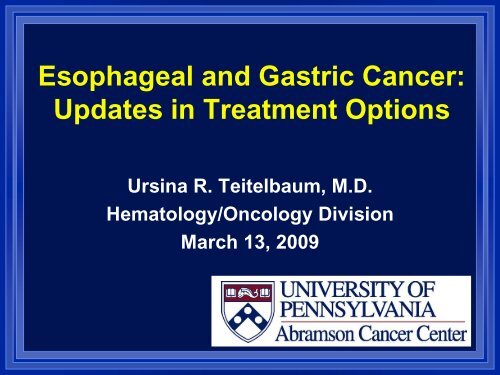

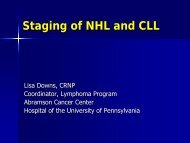
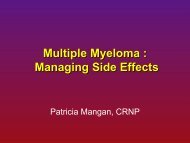
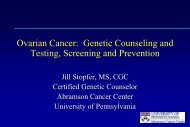
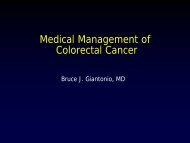
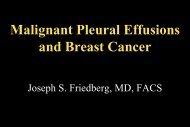

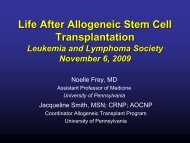
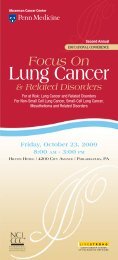
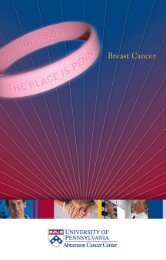
![Agenda [PDF] - Abramson Cancer Center](https://img.yumpu.com/35341208/1/190x245/agenda-pdf-abramson-cancer-center.jpg?quality=85)
